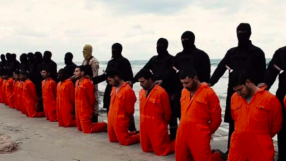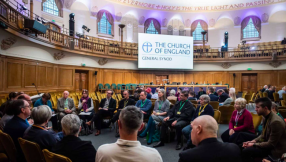
A few days after the election of Donald Trump, I was in a meeting which started with a couple of worship songs. But I found myself unable to sing them.
I love singing and have always found it a powerful way to connect with the Lord. Yet I am increasingly struggling with songs which seem to focus entirely on a sense of an exclusive, insular relationship with God. There seem to be endless songs of intimacy about how wonderful it is that God loves me, describing all the things he has done for me and just how amazing it is to be close to him. Just me and him existing together in an eternal love-in. It's all very cosy and reassuring.
But as I look at the world – at the suffering, heartache and injustice – I'm disturbed. These songs just aren't stirring me. As I look back at a year rife with division, hatred and brutal conflict, I'm desperate for something that speaks to these times. Something that reflects the enormity of God and how he relates to every part of the world; something that speaks to our call to be part of the bringing of his kingdom of peace, love and hope.
It strikes me that worship music has become symbolic of much of how we do church – and in essence what we believe it means to follow Jesus. Many of us were taught at a young age to accept Jesus as our personal Lord and Saviour. We were told to focus on that exclusive relationship, keep ourselves holy by reading the Bible, praying every day and abstaining from sex before marriage; to do everything possible to stay on track with God.
As I've travelled around the world and integrated myself into communities nothing like the one I grew up in, I've had a revelation of a different kind of Jesus. I've seen him in homeless alcoholics, suicidal men in mental health hospitals, those with all kinds of addictions and abilities, families living in Indian slums and rural farmers in Ghana. And it's changed me.
I can no longer look at the Gospels and interpret them only as a call to walk hand in hand with God, keeping myself as pure as possible and looking forward to a day when there won't be any of the disruptive distractions of this life.
That's why song after song which ignores the wider world, which refuses to engage with the reality of all existence and disregards any role I might have to play in shaking things up, as Jesus himself did – can feel at best unsubstantial and irrelevant, at worst dishonouring to the God of all creation.
A few contemporary worship leaders have written one or two popular 'justice' songs but one-off songs given this label can end up as tokenistic if these themes don't weave their way through the lyrics of all their music. God isn't the God of justice just sometimes.
There are rumblings of a different kind of music – and I would love to know of other examples. For years Andy Flannagan has broken the conventional mould, inspiring us with a global perspective and imploring pleas for justice. In We Are Blessed, the cry is to: "Bring heaven to earth, Lord/ Bring peace where there'd fear/ Bring life where there's death, Lord/ Bring joy in these tears." Lyrics you can shout or weep through. Lyrics you can sing while you're reading the newspaper.
Other artists like Martyn Joseph and Gungor are reaching further with the meanings behind their songs; and I'd encourage more writers to press deeper into this. To ask themselves: what does it mean to write songs of both joy and despair in 2016?
I've been struck recently by the heart-wrenching songs of David Benjamin Blower on Welcome the Stranger, a protest album about the refugee crisis. When I heard him play recently, I couldn't get this image out of my head: "Jesus Christ is at the door with the orphans of our war." I meditated on it, the words rolled through my mind; I was forced to imagine Jesus as a refugee knocking on my door as well as my own complicity in this unprecedented crisis.
They're not conventional worship songs but I connect to the words a whole lot more than those we usually sing in church. Songs that become intercessions and laments; songs that help us connect to God through the stories of our time. Songs that move me to action.
The theologian Karl Barth is famously stated as saying you should preach with the Bible in one hand and the newspaper in the other. Could songwriters do the same?
Come on worship leaders, rise up. Give us something of substance that expands our worldview and speaks of God's passion for all of humankind. Give us songs we'll get hoarse singing as we grieve and hope for our world.
Write songs for such a time as this.













